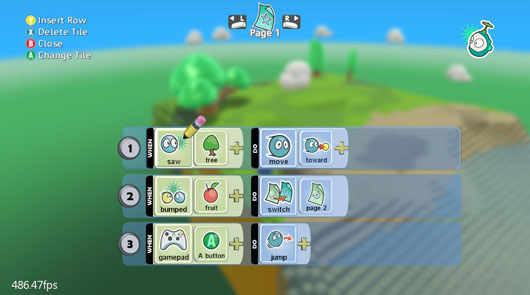As I’ve written before, I originally got the programming bug from a desire to build my own text adventure games. with significant influence from my dad. Now that I’m a father myself, I want my kids to have a similar opportunity, even if they never choose to go into the “family business”.
Of course, the technology has moved on significantly since the days of “You are in a maze of twisty little passages, all alike”. At CES yesterday, Microsoft announced Kodu which I’ve written about before under it’s original name Boku. Kodu came out of Microsoft Research as a tool for teaching kids how to program. The programming language is very visual and iconic and you use the Xbox controller exclusively for all input. Here’s a screenshot:

To demo Kodu at CES, Robbie Bach brought a 12 year old girl named Sparrow up on stage to demo. I showed the video to my kids this morning and they went gaga for it. They’re a little young – Patrick turns 6 next month and Riley turns 4 later this year – but I think they’ll be able to get the hang of it (with a little help from dad). Below is the video of the CES demo, and there are more Kodu videos at On10 (Matthew MacLaurin on Kodu and Watch Kodu in Action).
Personally, I think this is brilliant. I have been eagerly waiting a change to play this with my kids for over a year, so I’m very excited that they’re bringing this to market. Seriously, Halo Wars just got bumped to the #2 slot on my “Most Anticipated Xbox Games of 2009” list.
I’m most interested in how these creations will be shared online. I couldn’t find any details, but Robbie specifically said “And on Xbox Live they can distribute and share those finished games with other people.” Will there be a charge? (“normal” Community Games cost between $2.50 and $10 a pop) How will parental controls affect shared Kodu games? I guess those details will come closer to release.
